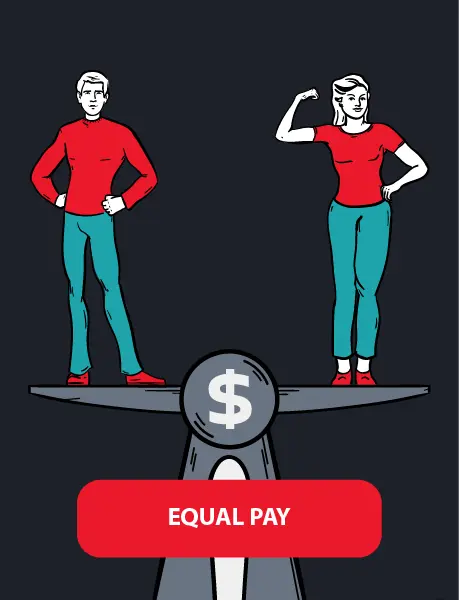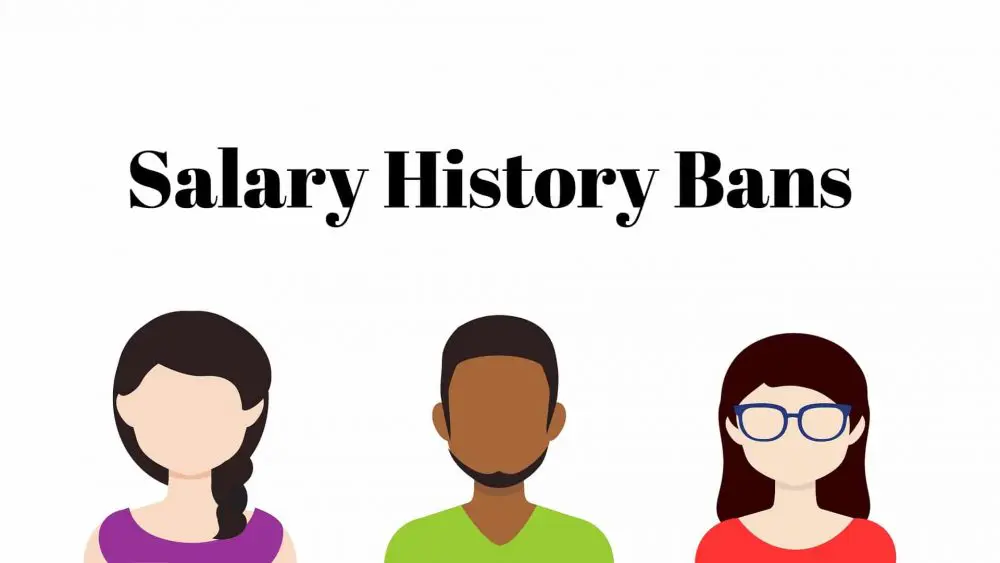Equal Pay and Wage Discrimination
Protect Your Rights with a New York Discrimination Lawyer
You have the right to receive equal pay for equal work. Wage discrimination violates the law.
What is wage discrimination? Pay discrimination can mean paying women less than men, paying someone less because of their race or religion, or underpaying an employee because of a disability.
Wage discrimination is a serious offense. In New York, victims of pay discrimination can receive three times the pay differential in damages. If you experience salary discrimination, an employment lawyer can help.
Contact New York discrimination lawyer Charles Joseph for a free consultation to protect your rights. Charles Joseph’s firm has recovered more than $200 million for clients. Reach out today for a free, confidential consultation.
Know Your Rights – What is Wage Discrimination?
It is illegal to pay women less than men for the same work.
Employers must provide equal pay for equal work. Discriminating against an employee by offering lower wages or benefits creates wage inequality and violates the law.
Equal pay laws apply to pay differences based on gender, race, religion, age, or disability. A gender pay gap violates these equal pay laws.
New Yorkers have protections against wage inequality or a gender pay gap under several laws. The Equal Pay Act of 1963 (EPA), Title VII of the Civil Rights Act of 1964 (Title VII), the New York State Human Rights Law (NYSHRL), and the New York City Human Rights Law (CHRL) all protect workers from wage discrimination.
If you believe that you have been the victim of compensation discrimination, you are protected under federal, state, and New York City laws.
Equal Pay Act and Gender Wage Gap Protections
The Equal Pay Act requires equal pay for men and women. The law mandates that men and women be paid the same for equal work in the same establishment. The jobs do not need to be identical, but they have to require substantially equal skill, effort, and responsibility, and they have to be performed under similar working conditions within the same establishment.
Two people with different job titles may have substantially equal jobs based on the tasks they perform.
Wage Discrimination Examples:
- You worked your way up to the position of regional manager. A male regional manager with similar training and work experience was recently hired, and you learn that he will be paid more than you.
- Your company’s health insurance policy does not cover your husband, because it is assumed that he will have his own benefits. However, your male coworkers’ wives are all covered by the policy.
- You are a top salesperson for your company, but your employer reassigns you to a less desirable territory, while a male employee with lower sales is given your territory and client base, enabling him to make much more in commissions than you.
- You work as a salesperson at a high-end retail store that sells men’s clothing. The male sales staff receives a $12,000 per year clothing allowance. The female sales staff do not. This may violate the Equal Pay Act.
Contact an equal pay lawyer to report Equal Pay Act violations, a gender wage gap in your workplace, or other forms of wage discrimination. An employment lawyer can provide a free consultation on your equal pay lawsuit.
Wage Discrimination
In addition to equal pay laws and other laws mandating equal pay for men and women, laws also protect other groups from wage discrimination
It is illegal to pay someone less because of race, color, religion, national origin, age, or disability. At the federal level, Title VII, the Age Discrimination in Employment Act of 1967, and the Americans with Disabilities Act of 1990 all prohibit wage discrimination.
Wage Discrimination Examples:
- An employee with a disability receives less pay than co-workers without disabilities who perform the same job. The employer does not provide an explanation for the differential. This is illegal wage discrimination based on disability.
- A school district hires both cleaners and custodians to take care of the school buildings. Cleaners and custodians perform the same job duties, but custodians are paid higher wages than cleaners. All the cleaners are people of color, and all the custodians are white. The district justifies the higher custodian wages by arguing that custodians must take the civil service exam. Since both positions perform the same job tasks, the fact that custodians have to take the civil service exam does not justify paying them more.
- When an employee becomes eligible for Social Security retirement benefits, his boss cuts his wages since he will be receiving Social Security. This is illegal wage discrimination based on age.
The equal pay laws protect employees from compensation discrimination in any form, including salary, overtime pay, bonuses, stock options, profit sharing, life insurance, benefits, and vacation or holiday pay.
The New York Pay Equity Law
New York offers some of the strongest wage discrimination protections in the country. For example, the New York Pay Equity Law makes it easier to recover damages for wage discrimination.
Under federal law, victims of wage discrimination must show that they did not receive “equal pay for equal work.” However, the New York Pay Equity Law requires equal pay for “substantially similar work.”
Victims of pay inequity can file a lawsuit. The law provides damages of four times the amount victims were underpaid in backpay. Victims can also receive other damages.
Pay Equity Examples:
- A company hired two teachers with similar backgrounds and qualifications. The Black teacher received $50,000 per year, while the white teacher received $60,000 per year. For three years, the Black teacher received $10,000 less per year for the same job. That teacher should receive $40,000 for every year they were underpaid, for a total of $120,000.
- A construction manager realizes she’s been making $20,000 less than her male coworkers. The company owes her $20,000 in unpaid wages plus $60,000 in damages, for a total of $80,000 for every year she was underpaid.
- A startup hires three new employees as computer programmers. All three employees perform similar tasks and have similar responsibilities, even though they have slightly different titles. The employee with a disability receives $15,000 less in salary than the other two employees. They can sue for $15,000 in unpaid wages plus $45,000 in damages, for a total of $60,000 for every year they were underpaid.
The law allows differences in pay for some reasons, including seniority or qualifications. An employment lawyer can help victims pursue a case against their employer.
Employees Can Discuss Wages
It is illegal for employers to ban employees from discussing their wages with co-workers.
Employees are legally allowed to inquire about, discuss, or disclose wages with other employees in order to uncover wage discrimination. However, no employee can be required to discuss wages with another employee.
Differences in pay may be legal under particular circumstances. Pay differences must be based on a seniority system, a merit system, a system based on quantity or quality of production, or another valid factor such as education, training, or experience.
NYC Salary History Ban
Under New York City’s salary history ban, it is illegal for employers to ask about an applicant’s salary history during the hiring process.
Inquiring about salary history during the hiring process can reinforce wage inequality and worsen the gender pay gap in the workplace. This is particularly harmful to women and people of color.
Salary negotiations should be based on the applicant’s qualifications and the requirements for the job.
The NYC salary history ban makes it illegal for a potential employer to ask for your salary history. If a hiring manager asks for your salary history in job postings, on applications, or in interviews, you can file a claim.
Learn more about the NYC salary history ban.
Retaliation is Illegal
If you complain about wage discrimination, it is illegal for your employer to take any action against you.
It is illegal for employers to retaliate against applicants or employees who complain about pay discrimination. This includes including filing a gender wage gap charge with the Equal Employment Opportunity Commission (EEOC) or any state or city agency.
Employers also cannot retaliate against employees who participate or act as a witness in a gender wage gap or compensation discrimination case.
You Are Protected From Retaliation Even If There Was No Discrimination
As long as you had a good faith and reasonable belief that pay discrimination occurred or a gender wage gap existed, your employer cannot take any action against you for speaking out or participating in any investigation or proceeding. It does not matter if an agency or court determines that there was no pay discrimination or gender wage gap.
If you speak out about pay discrimination or a gender wage gap in your workplace, the law protects you from retaliation.
How To File An Equal Pay Lawsuit
If you choose to file an equal pay lawsuit, you have several options. You can file a complaint with the U.S. Equal Employment Opportunity Commission (EEOC), which handles violations of federal equal pay law. The New York State Division of Human Rights handles NYSHRL violations, and the New York City Commission on Human Rights is responsible for CHRL violations.
In wage discrimination cases where your claim falls under multiple laws, the three agencies have what is called a “work-sharing agreement,” which means they cooperate with each other to process your claims. There is no need to file a claim with each agency. You just need to indicate that you want your claim “cross-filed” with the other agencies.
Learn how to file a discrimination claim, how to file an EEOC complaint, or contact a New York equal pay lawyer for help.
During a wage discrimination lawsuit, an employment lawyer can help you build the strongest case and protect your rights. Charles Joseph has over twenty years of experience with Equal Pay Act violations and other forms of pay discrimination, including gender wage gap cases.
Contact Charles Joseph for a free consultation on wage discrimination cases.
Employment Discrimination FAQs


